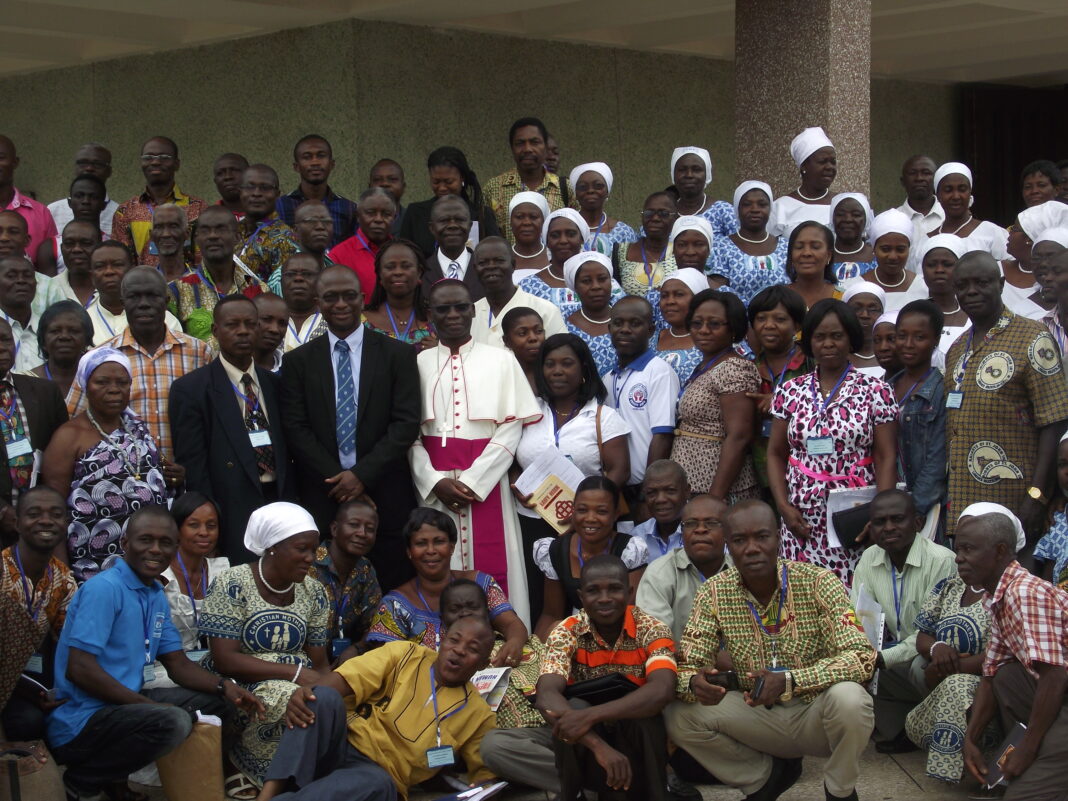Introduction
The word ‘front’ may be understood in military terms and could therefore be defined as the foremost line or part of an armed force: the furthest position that an army has reached and where the enemy is most engaged. The militants here engaged may be referred to as the vanguard, the frontline, and in the context of our Church, they are the laity. Moving on with this metaphor, we may be reminded that it was Pope Pius XII who in 1942 first talked about the laity as being at the frontline of the Church, for they are the Church. The French theologian, Yves Congar, whose impact on the Second Vatican Council (1962-1965) was quite immense, hinged his theology of the laity on their triplex munera as priest, prophet and king; hence the so much conciliar and post conciliar focus on the laity and what they could do in the Church and in the world. The laity front cannot be seen as being built until there is this recognition that the laity are also servants of Christ and stewards of the mysteries of God (cf. 1Cor 4:1). It is only then that the laity could be determined as fit for mission.
The Vatican 2 document which sought to describe the nature, character and diversity of the lay apostolate, Apostolicam Actuositatem (AA) urged that the hierarchy has the duty to support, direct and promote the lay apostolate. This Vatican decree on the apostolate of the laity asked for special councils to be formed to assist in this. This special council for the lay apostolate is what was understood in Ghana to constitute the laity front. Building the laity front therefore amounted to erecting the structures of the laity council and equipping them to oversee the apostolate of the laity. The role of the Chaplain in building the laity front is coincident with whatever they could do to help establish the laity councils, and to support their efficient and smooth running. It is to offer some suggestions as to how this could be done that I am engaged with this article. I intend stepping into this with delineating how the structures of the laity council began to be established in Ghana, and how they could be formed at the grassroots – the parishes, what their functions are, and what their modes of practice could be. Even though I will all the while be making indications of what the laity chaplain could be doing to support these processes, I would prefer to spend another section focusing specifically on the chaplain’s functions on the laity front and how such functions interact with those of some other significant officers of the laity council.
The Beginnings of the Laity Council in Ghana
It should be noted that in Ghana Laity mobilisation took off even before the close of the Second Vatican Council, with the creation in 1964 of the Department of Lay Apostolate and Social Action at the National Catholic Secretariat in Accra. It was under the charge of Most Rev. Gabriel Champaigne, Bishop of Tamale. At the time Ghana had only seven dioceses. Fr. Francis Vestraelen was appointed full time secretary of that Department.
Fr. Vestraelen travelled the length and breadth of the country sensitising the laity and helping them organise parish apostolate committees and selecting local lay persons as national contact persons for the various dioceses. Lay organisations were given greater attention. Emphasis was placed on marriage and family apostolate. The youth were given special attention and a place in the church. The spirit of ecumenism was kindled and church life began to assume a much healthy dimension. The lay faithful began to realise and assume their proper role as collaborators in the mission of Christ. Hitherto, there was the notion that the parish priest was the Church. The term ‘lay faithful’, which was derogatory, and defined in terms of ‘non-cleric’, began to be redefined properly as ‘the people of God’.
All the dioceses were encouraged to appoint lay apostolate directors to coordinate laity activities in their respective dioceses, and to be responsible for laity promotion. The dioceses were again encouraged to appoint contact persons, who will maintain direct links with the Executive Secretary of the Department of the Lay Apostolate and Social Actions at the National Catholic Secretariat. The lay apostolate directors and diocesan contact persons held regular meetings with Fr. Vestraelen and Bishop Champaigne to formulate strategies for laity mobilisation and formation. By 1971 the then Archbishop Peter Poreku Dery of Tamale had assumed responsibility for the laity, and he had become the driving force behind the development of the laity in Ghana. His support for the lay Apostolate led to the establishment of the National Catholic Laity Council (NCLC), Ghana in 1976, to be the guiding force for the lay apostolate.
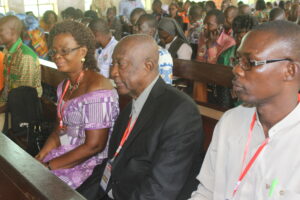
It seemed that with the establishment of the NCLC the laity front was being built. Following the Council’s inauguration structures were put in place in all dioceses, which facilitated the formation of diocesan laity councils, which were given the mandate to erect branches of the Council in all parishes of the dioceses. The stated objectives of the National Diocesan and Parochial Laity Councils were:
- a) To plan and promote the training and formation of Christian leadership at the parochial, diocesan and national levels;
- b) To organise laity seminars at all levels for the church communities and to foster the implementation of resolutions at such seminars;
- c) To ensure that all information and directives from the diocesan and national councils are passed down to the grassroots;
- d) To organise in such a way that functions which do not necessarily have to be taken by the clergy are effectively carried out by competent members of the laity;
- e) To encourage all the faithful to undertake serious in-depth study of Catholic doctrine and relevant documents.
Establishing the Laity Councils
At the inception of the effort towards laity mobilisation for the apostolate in the mid-1960s, up to the end of the 1970s those individuals who became contact persons and lay directors and who therefore took up leadership of the national movement were nominated to their positions by their respective bishops. Therefore even when the laity council was established in 1976 it was not really a representative body. We may very well see it as a Commission set up by the Church to perform specific functions. Later on the elective principle was introduced and practised everywhere. It turned out therefore that the laity council then became a representative body with some of its members elected while others were appointed by the responsible authorities. At the national level the laity council is constituted of five representatives from each of the twenty dioceses of the country. There are also five representatives each from the Ghana Catholic Youth Council (GHANCYC) and the National Council of Catholic Women (NCCW). Additionally the national Catholic lay associations are represented by a delegate each. Finally the laity constitution provides that Ghanaians elected to serve on the Dicastery for the Laity, Family and Life in Rome, the Pan African or West African Regional Laity Coordinating bodies should be members of the laity council.
It should be understood that the laity council is meant to be a grass root movement; that is, there should be branches of the council in every diocese of the country, and most urgently every parish of all the dioceses, where the people live and practise their Christianity. The diocesan council is not that difficult to constitute: it is at the parish that the greatest of challenges are encountered with forming the laity councils. This is where the laity chaplains could liaise with their priestly colleagues who serve at the parishes to throw their weight behind the process of erecting the laity front.
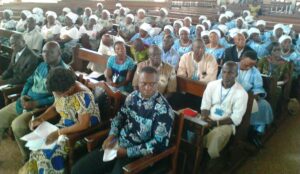
At the parish level the laity council needs to be a thoroughly representative body consisting of representatives of the parish lay associations, small Christian communities and the professional guilds. The lay associations tend to exist in most parishes of the country; it is the small Christian communities and the professional guilds that are not readily found in many parishes. The laity Chaplain could take it upon himself, with the help of his fellow priests, to encourage the formation of these laity organs in the parishes of the diocese. The three sources of laity leadership are all helpful in the sense that they contribute to the building of the laity front in quite unique ways. While each of these organs could be expected to engage themselves with the education and formation of the laity, the lay associations represent the mobilisation of the diverse charisms of the baptised, the small Christian communities represent the presence of the Church in the respective neighbourhoods of the parish and therefore constitute the germs for the establishment of new parishes. The professional guilds also yield to the church the learned and acquired expertise of the laity for the purposes of the apostolate.
The parish laity council is therefore not anybody’s collection of favourites, but an assembly of leaders among the laity. The parish laity chairperson is therefore the leader of lay leaders in the parish and should be accorded that dignity and recognition. It is recommended that the parish laity council meets every quarter of three months to review its activities over the period and to strategize for the next three months.
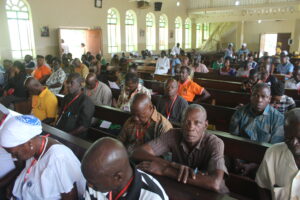
Article 3 Clause 2 of the laity constitution states: “The Council shall serve the Church through the activities of its members”. The members of the Council are actually the lay associations, the small Christian communities and the professional guilds. It is therefore generally expected that it is the lay associations, small Christian communities and the professional guilds that would undertake the education and formation of the laity, and mobilise them for the apostolate. The role of the parish laity council should everywhere be distinguished from those of the parish pastoral councils, which are basically to help the parish priest with parochial management and administration. The functions of the laity council have to do specifically with coordination, facilitation and monitoring the apostolates of the lay associations and the other groupings. When the parish laity council meets at the end of the quarter, it is to ensure proper coordination and monitoring of the activities of the lay associations and the others. The Council has the duty to provide for optimal use of parish resources and of space and time. It is also to ascertain that the constituents are actually pursuing with dynamism and commitment their own stated aims and objectives as approved by the Church.
The laity council facilitates the activities of its constituents by focusing on leadership training and creating opportunities for the whole parish to address its main challenge of making the Church a sacrament to the world. The Council organises workshops, seminars, retreats and recollections for the leaderships of the laity, to upgrade their knowledge of the teachings and life of the Catholic Church and also to grow them spiritually. The parish laity council could also show interest in growing the parish associations by organising societal fairs, durbars, and anniversary celebrations. By this way the council’s organs could be brought to public attention and even be helped with funds mobilisation. The laity chaplain should be aware of all these possibilities and give them his spiritual backing.
The Laity Chaplain’s Role in Relation to that of other Significant Officers
Issues about the role of the chaplain in the affairs of the laity council tend to come to the fore as part of the discussions on what we refer to as collaborative ministry necessary for the growth of the Church. Most certainly the person who functions as the Chaplain of the laity council would be a priest; that has been the case since the laity council was established in 1976. There was only once in the history of the council that a female religious, Sister Marie O’Driscoll, in the late 1980s, served as the chaplain of the National Laity Council.
Constitutionally, at the national level, the Executive Secretary of the National Catholic Secretariat (NCS) Department of Pastoral Ministry and Evangelization also functions as the Chaplain of the national laity council. At the diocesan level the local ordinary appoints whoever he desires to be chaplain of the diocesan laity council, and it is always a priest who gets appointed chaplain. When it comes to the deanery level, what happens is that the deanery fathers meet to elect someone from among their members to be the chaplain of the laity council. At the parochial level the parish priest or his representative (almost invariably one of his curates) doubles as the chaplain of the laity council.
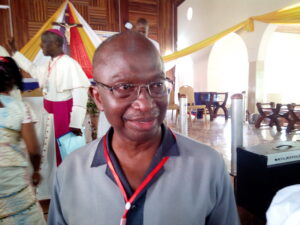
National Catholic Laity Council
As already noted, at the national plenary of the laity council, it is expected that there will be 21 chaplains among the around one hundred and ten members who constitute the council, that is, almost every fifth person at the plenary is a priest. The council is therefore quite unlike a trade union or even a body of the laity in a congregational church. The laity council does not have any powers pertaining to church governance. It can only make statements about church governance in the form of Messages, Resolutions or Petitions directed to the appropriate church authority. The bishops at the national laity plenary represent the bishops’ conference and ensure that the proceedings at the plenary align with the norms of Catholic faith and practice and also with the objectives of the bishops’ conference. The diocesan chaplain at the national plenary is one of the representatives of the diocesan church at the national level. He is expected to be involved in the discussions at the plenary and also to cast his vote when it comes to decision making.
Whenever there arises the need to clarify the role of the chaplain in the affairs of the laity council, it must have been that there was some sort of functional conflict between the chaplain and one or other officers of the laity council. And this tends to happen quite frequently at the diocesan level. The other functionaries whose roles one way or another happen to be rubbing against those of the diocesan chaplain are the diocesan lay director and the diocesan laity chairperson. I should prefer at this point to spend some space to clarify the different roles of these functionaries.
To properly specify the functions of the three diocesan leaders of the laity council, it is necessary to review the functions of three national leaders of the laity council who occupy positions corresponding to those of the diocesan leaders, whose respective roles sometimes become contentious. The officers whose functions I wish to review are the national chairman, national coordinator and the national chaplain. It is required that I do that because the current constitution of the laity council, applying the principle of hierarchical functional inheritance, spells out the functions only of national officers (Art.5) and not those of officers at any other levels of the laity council. The implication is that unless otherwise stated, the diocesan chairperson performs the same roles at the diocesan level as the national chairman does at the national level. The diocesan chaplain performs the same roles at the diocesan level as the national chaplain does at the national level.
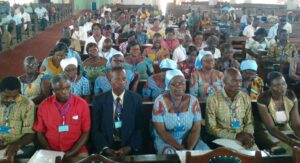
The National Chairman
Article 5, Section A, Clause (i) of the laity constitution proclaims the national chairman as the leader of the Catholic laity in Ghana. Note that it is not the national chaplain who is the leader of the laity in Ghana. As leader, he/she represents the Catholic laity at all forums, and speaks on behalf of the laity everywhere. The other clauses of Article 5, section A specify the other roles of the national chairman:
(i) (S)he convenes and chairs all meetings of the Council and its executive committee.
(ii) The chairperson provides the agenda for all meetings. In that respect, it is what he/she has approved of that will be discussed at the Council’s meetings. This is how the Council comes to bear the stamp of the chairperson, and pursues his/her vision for the laity in Ghana.
(iii) He/she legitimises all reports when they bear his/her signature.
(iv) The chairperson sanctions expenditure of the council, being guided by the budget approved by plenary. In that respect the chairperson becomes the main enforcer of the decisions of plenary.
The National Coordinator
The functions which the laity constitution assigns to the national coordinator are purely administrative: carrying out the decisions of the council, planning, managing, generating and coordinating programmes, facilitating communication, keeping records and documents. Being the administrative head at the national office of the laity council, the coordinator becomes the link between the council and the National Catholic Secretariat (NCS). This means that no officer of the laity council can have access to any of the offices of the NCS without it being facilitated by the national coordinator. The coordinator is also the link between the national council and the lower level councils.
The National Chaplain
The functions of the national laity chaplain are somewhat complicated considering that the person who constitutionally can occupy that office is also the Executive Secretary of the NCS Department of Pastoral Ministry and Evangelisation. The NCLC is a unit of this department, and all communication and interaction with the NCS passes through this office. That notwithstanding, as an officer of the NCLC, the national chaplain is assigned well defined roles. He is in charge of the spiritual animation and wellbeing of the members of the Council. He is the canonical guide to the Council, and acts as the voice of moderation and reconciliation during the Council’s deliberations.
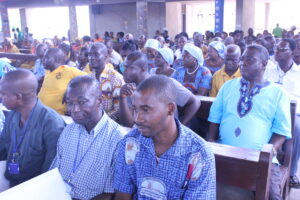
Diocesan officers
As has been indicated, diocesan officers inherit the functions assigned to the corresponding national officer unless otherwise stated in the constitution. Therefore, generally the diocesan chairman plays the same role as the national chairman, and the diocesan chaplain plays the same role as the national chaplain.
All that notwithstanding, at the diocesan level the constitution provides for one modification of this general rule, and this is as a result of the presence of the lay director at the diocesan level. The office of the lay director exists only at the diocesan level. He is the only diocesan official whose functions are specifically spelt out in the constitution (Art 12 Section 5). The lay director is an officer whose position straddles between the laity council and the diocesan secretariat of the bishop. As an officer of the bishop’s secretariat, he acts as the primary functionary of the bishop in the matters of the lay apostolate, and the bishop’s first advisor on laity issues. The Lay director has to be a person of proven competence, able to interact with all sections of the Catholic population in the diocese. It is for this reason that he is accorded the dignity of lay leader – the spokesperson and representative of the laity at all forums in the diocese.
Within the laity council the lay director acts as coordinator, that is, the administrative head of the council at the diocesan level. He is in charge of carrying out the decisions of the council, planning, managing, generating and coordinating programmes, facilitating communication, keeping records and documents. The lay director therefore takes over the functions of the National Coordinator at the diocesan level. He functions as the liaison between the diocesan council and the diocesan secretariat of the bishop.
It is the diocesan laity chairman who convenes all meetings of the diocesan laity council and its executive committee. He/she provides the agenda for meetings and chairs the proceedings. He/she signs all documents and therefore legitimises them, and also sanctions expenditure.
The diocesan laity chaplain, like the national chaplain, is in charge of the spiritual direction and animation of the members of the laity council. He gives canonical guidance to the council, and moderates their deliberations along the lines of Christian charity.
It should be noted at this point that leadership within the laity council is in character shared leadership, in which officers perform their respective roles with the help and support of other officers. While it is the case for the national chairman to provide the agenda for all meetings, s/he cannot do so without the advice of the national coordinator or/and chaplain. The same applies to the diocesan chairperson, who will find it very helpful to consult the lay director and the diocesan chaplain in drawing the agenda for meetings. Neither can the lay director put out any statement on behalf of the laity of the diocese without consulting the diocesan chair and chaplain.
The reason the lay director is not merely the coordinator at the diocesan level is that his/her office and functions go far beyond the compass of the laity council. For those aspects of the lay apostolate which fall under the remit of the laity council, s/he acts as coordinator. But in accordance with the laity constitution, it is the lay director, and not the chaplain or the chairperson who is the representative of the bishop in the context of the laity and s/he provides a perennial expression for the ministry of the bishop with the laity. It is clear that the functions of the laity council cannot completely encompass the entire vision of the bishop for the laity, and the lay director is that official who brings into material effect all that the bishop conceives for and intends to do by means of the laity. In that sense the lay director is the bishop’s vicar for the lay apostolate, and has the ear of the bishop to pass on to him what the expectation of the laity is with regard to their spiritual education and formation for the apostolate.
When it comes to the diocesan laity chaplain we should note that first and foremost the laity chaplain has concern for the spiritual education and formation of the laity, and this is central to the functions of the laity council. Article 2 of the Council’s revised constitution talks about the authority of the Council and underlines the Council’s role in supporting the laity to acquire knowledge of Christian teaching, which shall be appropriate to each one’s capacity and condition, “so that they may be able to live according to this teaching, to proclaim it, if necessary, to defend it, and be able to play their part in the exercise of the apostolate” (Art 2 of the Revised Laity Constitution).
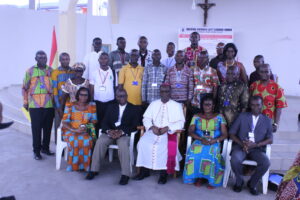
The late Holy Father, Benedict XVI, on the 11th of June 2007, talked about what he referred to as the “educational emergency”, when opening a convention of the diocese of Rome. He talked about difficulties in transmitting to the younger generations the values that give the bare structures of life. He noted a certain relativity in modern perception of reality, which should be addressed. This is something that chaplains should worry about. Benedict XVI again in his second encyclical Spe Salvi throws new light on the instruction of the baptised in a vibrant and coherent faith, and this is fundamental to the Church and all its educational and pastoral activities. I would encourage the laity chaplains to turn their gaze on the lay movements and organisations. They provide a docile audience and a willing platform for the mobilisation of the laity for the apostolate. In our secularised and individualistic world, the movements, the guilds and the small Christian communities reawaken in the faithful an awareness of belonging to the church. And in our Church this is the structure available to the laity council for mobilisation for the mission.
Canon 564 defines the chaplain as “a priest to whom is entrusted in a stable manner the pastoral care, at least in part, of some community or special group of Christ’s faithful to be exercised in accordance with universal or particular law”. The law establishes the chaplain as a canonical figure in the person of a priest, who is accountable to a diocesan bishop. The laity chaplain should recognise the aims and functions of the laity council set out in Articles 3 and 4 of the laity constitution, and rejoice in them. The chaplain should be zealous in guiding God’s people to embrace the call to holiness. In their task to order the temporal world according to the mind of Christ, the laity need the guidance of their chaplain. The laity are encouraged to interact with the world with a Christian conscience, such conscience as has been formed and crafted through the industry and tenacity of the chaplain.
It is the chaplain’s role to help the Council to empower the laity in the matter of training, formation and infusion of Catholic thought. The chaplain is key in planning activity and in harmonising activity among the laity. For the Council, the chaplain in collaboration with his bishop is the teacher, the shepherd, the sanctifier of souls. He should collaborate with the Council to develop ways and means to preach God’s word to families and movements, and help them to be firmly rooted in the faith.
It is desirable that the Chaplain attends all Council meetings, including executive committee meetings. His advice is frequently needed and his absence may result in the delay of decisions. The presence of the chaplain at meetings adds weight and dignity to the meetings. The prayers he makes and the opinions he expresses constitute a basic spiritual good to the Council and its members. Whenever the Laity Council has to intervene in political matters or express opinion on national/cultural issues the advice of the chaplain is most crucial.
Chaplains empower people to draw upon strengths of their spirituality to meet the challenges of life. Chaplains must be looked up to and respected for being the voice of the little man, the small cog in the wheel of the organisation. He must be the voice of the conscience, not intimidated by position or rank, speak differentially, but unambiguously where complex ethical questions arise. The chaplain should be the convener of minds in effective dialogue. The chaplain should be the voice of the convinced minority conscience, well versed in and effective in communicating the primacy of conscience.
Conclusion
In this rather brief treatise I have endeavoured to delineate the role of the laity Chaplain in building the laity front. From the mid 20th century there has been an on-going paradigm shift in attitude towards the laity in the Church. Participation in the life of the Church is now predicated only on the reception of baptism, making the laity also people of mission. Magisterial documents since the Second Vatican Council point to the secularity of the apostolate of the laity. They are to order temporal affairs according to the mind of Christ. The laity chaplain has to play a pivotal role in ensuring the laity are well equipped for this task by offering spiritual direction and animation, canonical guidance, and a voice of moderation and Christian charity.
The constitution of the laity council very clearly underlines the functions of each of its officers, including the laity chaplain. Therefore, there should not be any collision of functions among its officers. That notwithstanding, one cannot exclude entirely conflicts that may arise as a result of human factors. Whenever any such thing arises, it should be the laity Chaplain who should be expected to have the magnanimity to give ground. He has a very crucial role to play in building the front of the laity.
A good friend asked me to compose an acrostic piece to summarise what we expect the laity chaplain to do to help build the laity front. The result is the following four quatrains intended to draw attention to the four pillars of the Church – the doctrine, worship. life in Christ, and prayer – the dissemination of which should be the priority of every Church organisation. Let me close this discussion with those verses.
Quatrains for the Laity Chaplain
CARRY them on the wings of instruction;
HAPPILY to know the Church’s true doctrine.
ALERT them sure against modern falsehood;
PLY them always with Christ’s heavenly food.
LET them imbibe daily honest virtue;
AGAINST worldliness in justice be true
INSIST they imitate the hallowed ones;
NEVER give up; help them curb the passions.
CREATE in them deep longing for the Lord’s bread;
HOLY signs of faith keep them in devout dread.
AGAIN and ‘gain in worship bend the knee;
PLACE consciousness high on saintly degree.
LEARN in them the sublimity of prayer;
ADDRESS the Father every passing hour.
INVOKE the Virgin and the saint’d army;
NOURISH souls for land beyond the sky starry.
By Dr. Joseph Arko, Immediate Past National Chairman,
National Catholic Laity Council

